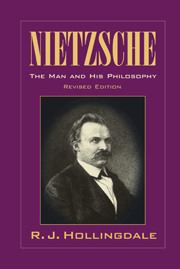Book contents
- Frontmatter
- Contents
- Preface to the Revised Edition
- A List of Nietzsche's Works
- Part I 1844-1869
- Part II 1869-1879
- Part III 1879-1889
- 8 The Turning-Point
- 9 The Wanderer
- 10 Lou Salome
- 11 Zarathustra
- 12 The Solitary
- 13 The Year 1888
- 14 The Revaluation
- 15 The Poet
- 16 The Collapse
- PART IV 1889-1900
- Postscript 1999
- Selective Bibliography
- Index
8 - The Turning-Point
from Part III - 1879-1889
Published online by Cambridge University Press: 13 September 2019
- Frontmatter
- Contents
- Preface to the Revised Edition
- A List of Nietzsche's Works
- Part I 1844-1869
- Part II 1869-1879
- Part III 1879-1889
- 8 The Turning-Point
- 9 The Wanderer
- 10 Lou Salome
- 11 Zarathustra
- 12 The Solitary
- 13 The Year 1888
- 14 The Revaluation
- 15 The Poet
- 16 The Collapse
- PART IV 1889-1900
- Postscript 1999
- Selective Bibliography
- Index
Summary
It is a war, but a war without powder and smoke, without warlike attitudes, without pathos and contorted limbs—all this would still have been ‘idealism’. One error after another is calmly laid on ice; the ideal is not confuted—it freezes. . . Here for example ‘the genius’ freezes; on the next corner ‘the saint’ freezes; ‘the hero’ freezes into a thick icicle; at last ‘faith’, so-called ‘conviction’, freezes; ‘pity’ also grows considerably cooler—almost everywhere ‘the thing-in-itself freezes. (EH—MA 1)
The collapse of Easter 1879 was the turning-point of Nietzsche's life. From then onwards he was incapacitated for normal social life, released from daily, weekly, seasonal routine, and driven back into himself. He had always tried to avoid responsibilities and obligations which might conflict with the sense he had of being reserved for some special mission: now the matter was taken out of his hands and whether he desired it or not he was apart and alone. It is clear now that this is what his nature required. He was essentially a solitary man, and those who have pitied him for his isolation should have asked themselves why, if he really disliked it, he did not end it. Within very wide bounds he could have lived wherever he wished, but in fact he established himself nowhere. The closest he came to a permanent residence was a single room in the house of the Burgermeister of Sils-Maria, a village in the Ober-Engadine, where he spent several winters. At other times he was in Genoa, Nice, Venice, Turin, or travelling between them, and in Switzerland and Germany. He lived in hotel rooms and lodgings, and his only property was the clothes he wore, the paper he wrote on, and a large travelling-trunk in which they were kept. Until his meeting with Lou Salome in 1882 he had still been keeping an eye open for a possible wife; but the outcome of his wooing of that young lady convinced him he was fated for solitude.
- Type
- Chapter
- Information
- NietzscheThe Man and His Philosophy Revised Edition, pp. 115 - 124Publisher: Cambridge University PressPrint publication year: 1999



